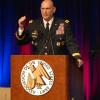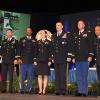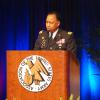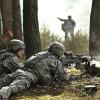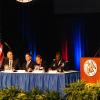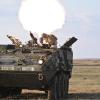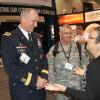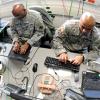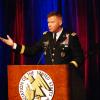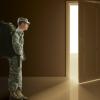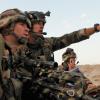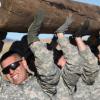While acknowledging the challenges that slashed budgets have wrought, the Army’s chief of staff said the Army Operating Concept, or AOC, will actually help the Army address future challenges.Gen. Ray Odierno addressed soldiers and industry representatives during the 2015 Association of the United States Army Global Force Symposium and Exposition in Huntsville, Ala., April 1.He said the budget cuts have reduced manning, readiness and modernization, but he then spelled out some of the things that would be needed for the service to continue operating in the current and future global security...
Deep budget cuts and talk about possible changes to troop compensation, especially as soldiers continue deploying for new and enduring missions around the world, are putting a strain on soldiers and their families, the president of the Association of the United States Army said."I think we’re stressing the force too much," said retired Gen. Gordon Sullivan. "Everybody says, ‘Thanks for your service. We love the troops.’ This is the time to put up."Sullivan sat down March 17 with Army Times as AUSA prepared for its annual Global Force Symposium and Exposition and senior Army leaders testified...
The Army’s top installations officer continued the Army’s call for Base Realignment and Closure (BRAC) to optimize resources and get rid of excess infrastructure."We are on record as saying we need a BRAC [Base Realignment and Closure]," Lt. Gen. David Halverson, the commander of U.S. Army Installation Management Command and assistant chief of staff for installation management, said April 21."BRAC is a four-letter word," said Halverson, speaking at an Association of the United States Army Institute of Land Warfare breakfast.Adding, "It has bad connotations to everyone, and we know that better...
Three soldiers, selected as the athletes and coach of the year for 2014, were honored and recognized at the Association of the United States Army Global Force Symposium and Exposition in Huntsville, Ala.Maj. Brian Hayes, a competitive runner who served two tours in Iraq during Operation Iraqi Freedom – first with the 4th Infantry Division and later with a Military Transition Team as an intelligence adviser to the Iraqi army – was recognized as the 2014 Army Male Athlete of the Year.He is now the executive officer, 305th Military Intelligence Battalion, Fort Huachuca, Ariz.Captain Jamie Pecha...
The Army Materiel Command’s commanding general said today’s Army is consuming readiness as fast as it can be generated.Gen. Dennis L. Via described his command’s role in the current operating environment at the Association of the United States Army Institute of Land Warfare Global Force Symposium and Exposition in Huntsville, Ala., April 1.Via said he agreed with the recent assessment made by the Army chief of staff, Gen. Ray Odierno, that the national security environment is the most uncertain he has seen in his career."At AMC, our optempo is reflective of the chief’s statement," Via said.Mor...
When it comes to the challenge of finding ways to innovate the Army to win in a complex world, Army leaders must be in tune with the risks and fallacies that could lead to undermining their own efforts.Lt. Gen. H.R. McMaster, deputy commanding general, futures and director, Army Capabilities Integration Center, U.S. Army Training and Doctrine Command, addressed attendees during the 2015 AUSA Global Force Symposium panel on "Army Innovation Under Force 2025 and Beyond," in Huntsville, Ala."We define innovation in the Army Operating Concept as really our ability to turn ideas into valued...
More than 6,000 military and industry attendees assembled at the Von Braun Center in Huntsville, Ala., to discuss Army priorities, exchange ideas and showcase new technologies during the 2015 Global Force Symposium and Exposition.Hosted by the Association of the United States Army, the three-day event consisted of numerous panels and presentations focused on the future force and how it will fight and "Win in a Complex World," according to the Army Operating Concept.But winning requires innovation. A panel titled "Increasing the Rate of Innovation," brought five subject matter experts together...
Lt. Gen. Ben Hodges, U.S. Army Europe commanding general, spoke at the Association of the United States Global Force Symposium and Exposition in Huntsville, Ala., focusing on several topics, including why Army Europe matters; Atlantic Resolve; new changes for the command and the ongoing Dragoon Ride."We are never going to fight by ourselves," Hodges said, speaking on why partnerships in Europe matter.Adding, "We are always going to have allies and we are always going to be with someone else. Our most reliable partners we can count on come from Europe, our NATO allies."He also spoke about...
Lt. Gen. Robert B. Brown, commanding general, U.S. Army Combined Arms Center, Fort Leavenworth, Kan., chaired the panel "Building Leaders who Thrive in Chaos," during the Association of the United States Army’s 2015 Global Force Symposium and Exposition at the Van Braun Center, Huntsville, Ala."We can win by shaping the Army as profession, but we must invest in its most valuable resource, its people," said Brown.Adding, "To dominate on the battlefield of the future, the Army must not only invest in long-term technological and equipment solutions, it must also invest in its people as the most...
The enemy is no longer simply holding a gun or standing on a battlefield."The capabilities to prevent cyber attacks, to mitigate cyber attacks, and to make sure that the information we that have in our networks and across our processes [are protected] – is critical for us at this time," said Maj. Gen. Daniel Hughes, program executive officer, command, control and communications (tactical), or PEO C3T.Hughes chaired the "Systems Engineering and Acquisition for the Cyber Challenge" panel discussion, moderated by retired Lt. Gen. Susan Lawrence, at the AUSA 2015 Global Force Symposium &...
Gen. David G. Perkins, commanding general, U.S. Army Training and Doctrine Command (TRADOC), discussed the Army’s way ahead during the opening day of the 2015 Association of the United States Army Global Force Symposium and Exposition at the Van Braun Center, Huntsville, Ala.Perkins explained the challenges that the future force will face based on the Army Operating Concept titled "Win in a Complex World.""You’re either winning or losing," said Perkins. "We define winning as exploiting the initiative to get to a position of relative advantage. I find winning not only possible, but desirable."T...
You’ve finally collected all the required signatures and stamps on your installation-clearing paperwork. The movers will be at your house in a few days to pack and move your family’s belongings to a new duty station. You’re looking forward to the challenges that await you at your next assignment, but you know you will miss your current unit.You’ve gone through countless training exercises here and a deployment or two, and you have seen command teams and soldiers come and go. You know the problems your unit has and perhaps even the causes and contexts of those issues. You even have some ideas...
“The adaptability, flexibility and versatility of land forces can be applied to diverse theaters and situations. The complexity, unpredictability and intermingling sought most often by hybrid adversaries require situational awareness, reversible maneuvers and the ability to discriminate. The capacity of land forces to impose their tempo on the adversary, synchronize their operations and work within the timeframe determined, directly influences the ability of a joint force to resolve crises.”
The above quote will ring true to readers familiar with the U.S. Army Operating Concept Win in a Complex...
“The adaptability, flexibility and versatility of land forces can be applied to diverse theaters and situations. The complexity, unpredictability and intermingling sought most often by hybrid adversaries require situational awareness, reversible maneuvers and the ability to discriminate. The capacity of land forces to impose their tempo on the adversary, synchronize their operations and work within the timeframe determined, directly influences the ability of a joint force to resolve crises.”
The above quote will ring true to readers familiar with the U.S. Army Operating Concept Win in a Complex...
The U.S. Army is a brand name. Many factors help generate a brand, which builds itself around values, ideas and services. While there is no doubt that the U.S. Army and specific units meet the criteria for a brand, the question for command teams and their units is what the brand represents. How do other units, militaries, host nations and civilian communities see your team as a professional organization? How are command teams generating that perception?One of the challenges in Mission Command is ensuring that soldiers underneath any echelon of command understand their vision and purpose as...


